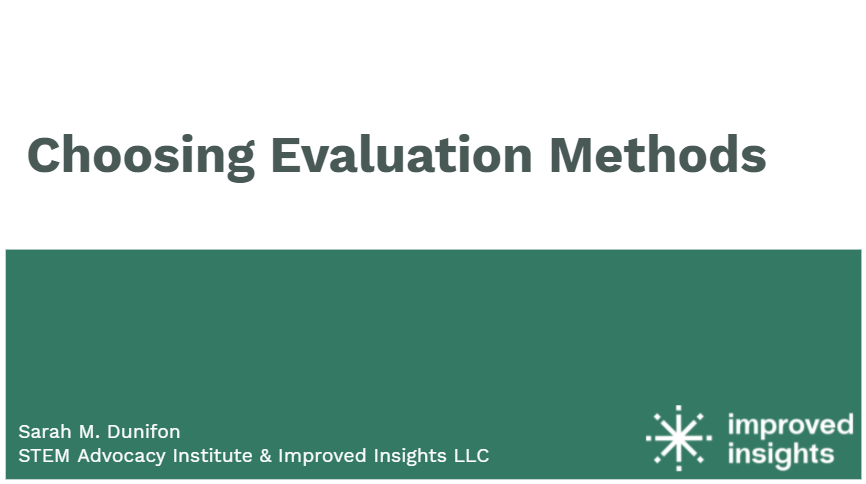
Insights
Investing in Evaluation
This post talks about investing in evaluation: the importance, how much to spend, and how to decide what to focus your efforts on.
Centering Equity in Evaluation
In this article, we’ll explore the Equitable Evaluation Framework™ (EEF) and how it helps to center equity in evaluation practices.
Why a Deficit Approach to Informal STEM Education Hurts Learners
In this article, we’ll explore who deficit thinking impacts the most, how deficit thinking plays out in formal and informal education, and how we - as educators and evaluators - can avoid it in order to impart greater equity and justice in our work.
Deep Dive: 21st Century Skills
This blog post does a deep dive into the concept of 21st century skills, including what this concept is, how it might be incorporated into your program outcomes, and how evaluators think about assessing it.
Deep Dive: STEM Engagement
This blog post does a deep dive into the concept of STEM engagement, including what this concept is, how it might be incorporated into your program outcomes, and how evaluators think about assessing it.
Science Communication is Not Just for Scientists
This blog post discusses science communication and its intersection with informal STEM education and evaluation.
Deep Dive: STEM Identity
This blog post does a deep dive into the concept of STEM identity, including what this concept is, how it might be incorporated into your program outcomes, and how evaluators think about assessing it.
New Publication: Impacts of a Near-Peer Urban Ecology Research Mentoring Program on Undergraduate Mentors
New publication in Frontiers in Ecology and Evolution: Impacts of a Near-Peer Urban Ecology Research Mentoring Program on Undergraduate Mentors.
What Approaches Are There to Conducting Evaluations?
We’re chatting about evaluation approaches for informal STEM learning.
What Can We Measure in Informal STEM Learning?
We’re chatting about informal learning and measurement in STEM.
The Greater Sum Foundation: Evaluating Your Impact
Learn about the difference between evaluation and research, how to begin evaluating your impact, and why evaluating impact is so important for nonprofit organizations in this lecture for The Greater Sum Foundation.
Outcomes in STEM Besides Achievement
Outcomes beyond academic achievement - like science interest, science identity, and 21st Century Skills - can be important for STEM learning and persistence.
Protecting Participants with Confidential and Anonymous Data
Learn the difference between anonymous and confidential data, plus when - and how - to collect each.
Choosing Evaluation Methods
Get an inside view on how we go about choosing evaluation methods that suit your audience.
Planning for Impact through Evaluation
Hear from Principal Evaluator Sarah M. Dunifon on “Planning for Impact through Evaluation” for STEM Advocacy Institute
Evaluating Your Impact with Sarah M. Dunifon
Hear from Principal Evaluator Sarah M. Dunifon on “Evaluating Your Impact” for The Greater Sum
Why Active Listening is Key for Evaluation Meaning-Making
As evaluators, we’re meaning-makers, truth-uncovers, and question-askers for not only the organization itself, but for all the stakeholders involved as well. It’s only through active listening that we’re able to gain meaning and provide the necessary insights.
How to Utilize Common Planning Tools for Evaluation Success
Rather than an afterthought, measurement and evaluation (M&E) should be at the forefront of every nonprofit’s organizational strategy. But where to begin? Measurement and evaluation are commonly thought of as late-stage efforts, particularly occurring at the conclusion of a program. It seems unfitting, if not downright premature, to outline M&E at the start. More than that, M&E seems inaccessible - too specialized and niche. However, both barriers are misconceptions.





















